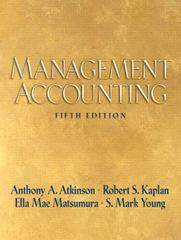Question
Clarissa McWhirter, vice-president of Cyprus Company, was pleased to see a small variance on the income statement after the trouble the company had been having
Clarissa McWhirter, vice-president of Cyprus Company, was pleased to see a small variance on the income statement after the trouble the company had been having in controlling manufacturing costs. She noted that the $41,410 overall manufacturing variance reported last period was well below the 3% limit that had been set for variances. The company produces and sells a single product. The standard cost card for the product follows:
Standard Cost CardPer UnitDirect materials, 4 metres at $3.90 per metre$15.60Direct labour, 1.7 direct labour-hours at $9.0 per direct labour-hour15.30Variable overhead, 1.7 direct labour-hours at $2.9 per direct labour-hour4.93Fixed overhead, 1.7 direct labour-hours at $5 per direct labour-hour8.50Standard cost per unit$44.33
The following additional information is available for the year just completed:
- The company manufactured 34,000 units of product during the year.
- A total of 134,950 metres of material was purchased during the year at a cost of $4.00 per metre. All of this material was used to manufacture the 34,000 units. There were no beginning or ending inventories for the year.
- The company worked 60,200 direct labour-hours during the year at a cost of $8.90 per hour.
- Overhead cost is applied to products on the basis of standard direct labour-hours. Data relating to manufacturing overhead costs follow:
Denominator activity level (direct labour-hours)59,600Budgeted fixed overhead costs (from the flexible budget)$298,000Actual fixed overhead costs$297,000Actual variable overhead costs$176,050
Required:
1.Compute the direct materials price and quantity variances for the year.(Indicate the effect of each variance by selecting "F" for favorable, "U" for unfavorable, and "None" for no effect (i.e., zero variance).)
2.Compute the direct labour rate and efficiency variances for the year.(Indicate the effect of each variance by selecting "F" for favorable, "U" for unfavorable, and "None" for no effect (i.e., zero variance).)
3.For manufacturing overhead, compute the following:
a.The variable overhead spending and efficiency variances for the year.(Indicate the effect of each variance by selecting "F" for favorable, "U" for unfavorable, and "None" for no effect (i.e., zero variance).)
b.The fixed overhead budget and volume variances for the year.(Indicate the effect of each variance by selecting "F" for favorable, "U" for unfavorable, and "None" for no effect (i.e., zero variance).)
4.Compute the total variance.(Indicate the effect of each variance by selecting "F" for favorable, "U" for unfavorable, and "None" for no effect (i.e., zero variance). Input all amounts as positive values.)
Step by Step Solution
There are 3 Steps involved in it
Step: 1

Get Instant Access to Expert-Tailored Solutions
See step-by-step solutions with expert insights and AI powered tools for academic success
Step: 2

Step: 3

Ace Your Homework with AI
Get the answers you need in no time with our AI-driven, step-by-step assistance
Get Started


